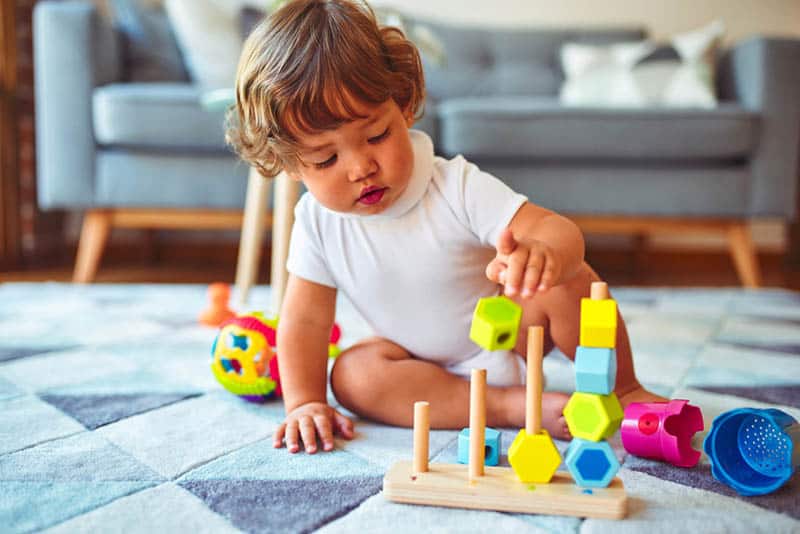18 month old not talking yet. When do babies start talking? Is my child a late talker?
If you’re a parent worried about your child’s language development, you have probably googled some, or all, of these things.
Perhaps you’re not worried that your child isn’t talking yet, but are just interested in learning some ways to help encourage your little one to talk and sharpen up his or her language skills.
If your 18-month-old is not talking yet there’s generally nothing to worry about, as all children develop at their own pace.
However, there are some milestones you should expect your child to reach by a certain age.
If your 18-month-old baby has reached other milestones typical for their age, (you’ll find these milestones listed below) but for some reason still isn’t talking, there’s no need to worry because your baby is probably what we call a late talker.
Some babies take more time to reach these milestones, so you should only start to worry if they don’t reach them at all.
Note: If you still have concerns about your child’s development, or you just want to be on the safe side, then you should consider consulting your pediatrician or speech-language pathologist about potential hearing loss or oral impairments.
Typical Developmental Milestones For An 18-Month-Old

When do babies crawl? And when do babies start rolling over?
Crawling, rolling over, and pointing at different objects are all developmental milestones that every healthy baby will eventually reach.
Diane Paul-Brown, PhD, director of clinical issues at the American Speech-Language-Hearing Association (ASHA) states in an interview with Grow by WebMD: “Most children develop language at their own pace, and there is a broad range of normal.”
Perhaps your baby will need more time to reach some of these milestones, but what matters is that she’s making progress at her own pace.
Tracking the progress of developmental milestones will help you understand the differences between healthy and delayed development, and see the bigger picture behind your 18 month old not talking yet.
With all that being said, most children have reached the following mini-milestones by the time they are 18 months old:
Language/communication milestones
• Says at least 10 single words (the average is 50).
• Says and shakes head implying “no”.
• Points with fingers at different objects to show someone what he or she wants.
Movement milestones
• Helps undress herself.
• Knows how to eat with a spoon.
• Walks without help.
• Knows how to drink from a cup.
Social and emotional milestones
• Hands things to others as a form of play.
• Plays simple “pretend” games, such as feeding a teddy bear or changing its diapers.
• May be afraid of/feels uncomfortable around strangers.
• Points to show others objects that he or she finds interesting.
• May have tantrums.
• Holds on to caregivers in unfamiliar situations.
• Shows affection to parents and other familiar people.
• Able to explore things alone, but with the presence of parents.
Cognitive milestones
• Scribbles.
• Capable of pointing to one body part.
• Recognizes and knows what ordinary things are, such as shoes or a bottle.
• Capable of following 1-step verbal commands such as “stand up”.
If your child makes progress with other milestones, but has difficulties mastering language and communication milestones, then they might be what’s known as a late talker.
Before we discuss late talkers, here are some other possible reasons for your 18 month old not talking.
How To Tell If Your Child Is A Late Talker

A late talker is usually between 18 and 30 months old.
Children who are late talkers have a good understanding of language and reach other developmental milestones, (hearing, cognitive skills, vision, etc.) but they have difficulty speaking (have a limited spoken vocabulary for their age).
Some children reach a communication milestone with time, while others don’t.
So, if your baby isn’t talking, but understands everything you say and reaches other developmental milestones (see above), then you shouldn’t be concerned.
For parents who are wondering about when babies say mum and dad, this usually happens at 12 months, but if your 18 month old baby still hasn’t said mama or dada, but says other words instead, you shouldn’t worry about it.
18 Month Old Not Talking – Possible Reasons Why

Speech delay
For all the parents who have googled “18 month old not talking but understands everything”, here’s an answer to your question.
Sometimes children have great receptive language skills (they understand what you’re saying), but due to expressive language problems, they struggle to speak even though they understand and are responsive to everything.
It’s important to understand that this is not necessarily a bad thing.
Children such as these are still communicating in their own way and progressing at their own pace. Over time, they will reach language and communication milestones.
Hearing problems
Many parents don’t even notice that their child has a hearing impairment until delayed speech kicks in.
If you’re concerned about your child’s hearing, or you just want to be on the safe side, consider visiting an audiologist to test your child’s hearing with a hearing test.
You should be sure to test your child’s hearing if he or she has had ear infections, or if you have a family history of hearing loss.
Oral issues
If your child doesn’t have hearing problems, but still has difficulty talking and forming words, it could be due to oral issues (problems with mouth or tongue, such as a tongue-tie or cleft palate).
If your child has an oral-motor problem, then they may also have problems with feeding.
Other secondary conditions/developmental delays that could cause problems with speaking:
• Intellectual disability.
• Cerebral palsy.
• Down syndrome.
• Childhood apraxia of speech.
• Dysarthria.
• Selective mutism.
• Autism spectrum disorder.
When You Should Start Worrying About Your Baby’s Language Delay

Some parents simply decide to give their child a little bit more time to catch up with a communication milestone, but this is not always a good thing to do.
If the reason for your 18 month old not talking is articulation delay due to secondary conditions such as Autism spectrum disorder, it’s important to react in good time so that the child can get adequate therapy.
For example, if babies stare without ever making eye contact it might be an alarming sign that something more serious is going on.
If your baby does the following things, it might be time to start worrying about their language delay and contact your doctor.
By 18 months:
• Your child mostly uses nouns and limited verbs.
• Your baby is quiet most of the time.
• Little babbling.
• Has had ear infections before.
• Has difficulties playing or interacting with peers.
• Limited consonant sounds.
• Uses limited gestures (such as waving bye-bye).
• Doesn’t link (understand) simple pretend games like feeding a teddy bear.
• Isn’t using gestures at all.
• Has difficulties with, or doesn’t imitate, words or sounds at all.
• Has trouble understanding simple requests such as “sit down”.
By 2 years:
• Uses specific sounds or words repeatedly.
• Unable to follow simple directions or understand simple requests.
• Has an unusual tone of voice.
• Only imitates speech or a certain action, but is not capable of producing words (or phrases) in a spontaneous manner.
• Use lots of different consonant sounds at the beginning of words.
• Uses simple two-word sentences like “more juice”.
If you notice that your child’s speech is harder to understand than is typical for their age, consider calling your doctor:
• Both parents and caregivers should be able to understand about 50% of speech made by a 2-year-old child.
• By 3 years old, parents and caregivers should be able to understand about 75% of a child’s speech.
• A 4-year-old child should be well understood, even by parents and caregivers who don’t know the child.
• By 12 months, children should be able to use single words, and may be able to say “mama” and “dada”
What To Do If Your 18 Month Old Isn’t Talking

If your 18-month-old baby is babbling, but not talking, there are some things parents can do to improve their child’s speech and encourage speech development at home or at day care center:
Playing interactive games
We all know that kids learn through play.
This is where Montessori toys and toys that encourage fine motor skills development come in handy.
The more you interact with your baby through play, the more expressions and words they will absorb.
There are so many fun things you can do with your baby and toddler, such as: blowing bubbles, finger painting, or playing Peek-a-boo.
Be as creative as you can.
Reading books
Choosing interactive books for babies is a great option for every parent, particularly if you have a child dealing with language delay.
By reading books to your child, you will introduce your little one to lots of new sounds and words.
Over time, they will start connecting those sounds and produce their first words, which will eventually become meaningful sentences.
Repeating words
This is pretty simple. All you need to do is say a word to your child and then tell them to repeat after you.
When you first tell your child to repeat words, they might only do it when they want to.
Don’t let that discourage you, though.
They might just babble these words at first, but later on they will learn how to pronounce them correctly.
When they master the ‘repeating game’, they will become excited about pronouncing the new words you give them.
REMEMBER: NEVER use baby talk

If you only use baby talk when talking to your little one, you should stop doing so immediately.
I understand how tempting it is to pretend that you’re a child with your little one, but you might inadvertently hinder the progress of their language development.
In other words, your child might think that babbling, aka baby talk, is the only way to speak.
So, instead of pronouncing words correctly, they will think that baby talk is the right way.
The more you interact with your baby in an adult manner, the faster they will absorb those words and learn to communicate.
If you don’t introduce your child to the correct pronunciation of words, they will not be able to learn them.
Instead, they will continue living in their own little bubble thinking that the whole world speaks and understands baby talk.
When they get a little older, it’s even more challenging to get them to talk, which is why this is so important.
Final Thoughts
18 month old not talking is usually not a reason for concern if they have reached other milestones that are typical for their age.
All children develop at their own pace, and some need more time to start talking than others.
Still, you should consider early intervention speech therapy for toddlers or preschoolers (if your pediatrician/pediatric speech therapist recommends it).
Note: The information on this site is designed for educational purposes only.
It is not an alternative for informed medical advice or care.
Always consult with a doctor or other healthcare professional.
It’s important to see a speech-language pathologist (SLP) as soon as possible in case your child has a problem.
References:
• Trubo, R. (2003.) Helping Your Late-Talking Children. Grow by WebMD.
Like this post? Please share or pin it for later. You can also stay in the loop and follow us on Facebook, Instagram or Pinterest.

We love honesty! Find Your Mom Tribe is an Amazon Associate and we earn from qualifying purchases through affiliate links at no extra cost to you. Please see our full Amazon Affiliate disclosure for more information.

